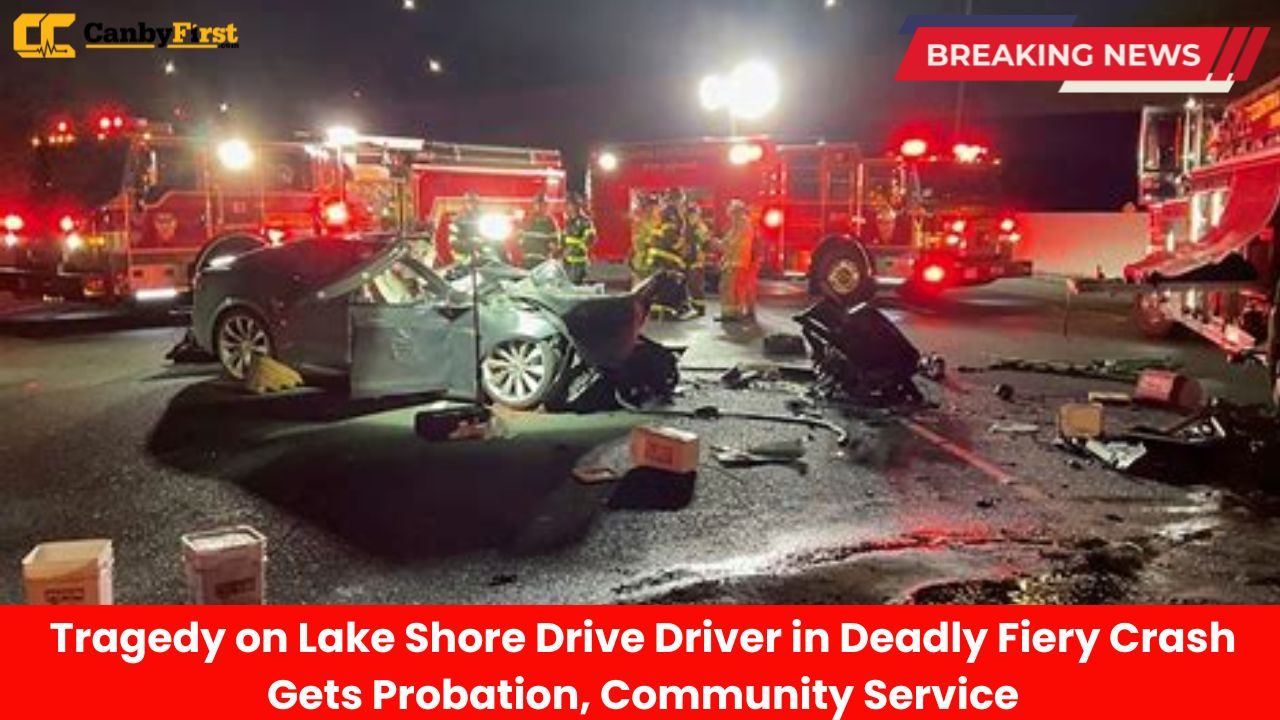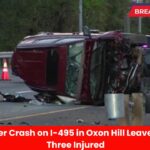Chicago, US: In a decision that has sparked mixed reactions across Chicago, a driver responsible for a horrific fiery crash on Lake Shore Drive that killed two people has been sentenced to probation and community service instead of prison time. The ruling, made this week at the Cook County Courthouse, has reignited debates over sentencing laws and justice for victims’ families.
The Fatal Night on Lake Shore Drive
The accident occurred late one summer night when the driver, identified as 24-year-old Marcus Hill, allegedly lost control of his vehicle while speeding northbound near the Oak Street curve. The car veered into another lane, colliding with an SUV before bursting into flames. Two passengers trapped inside the other vehicle were pronounced dead at the scene, while Hill sustained minor injuries.
Witnesses described the collision as a “flash of fire lighting up the night sky.” Emergency responders arrived quickly, but the heat and intensity of the blaze made rescue efforts nearly impossible. The crash temporarily shut down Lake Shore Drive for several hours as investigators worked through the wreckage.
Also Read
Charges and Legal Battle
Following a lengthy investigation, prosecutors charged Hill with reckless homicide, aggravated reckless driving, and driving under the influence. However, subsequent toxicology tests showed no presence of drugs or alcohol, leading defense attorneys to argue that mechanical failure and poor road conditions played a major role.
Hill pleaded guilty to reckless homicide in a negotiated plea deal earlier this fall. During sentencing, Cook County Judge Elizabeth Ramirez emphasized that Hill had shown genuine remorse and had no prior criminal history.
“This was a tragedy that changed multiple lives forever,” Judge Ramirez stated in court. “But the evidence does not support that prison is the only path toward accountability and redemption in this case.”
The Sentence and Public Reaction
Under the sentence, Hill will serve four years of probation, perform 500 hours of community service focused on road safety outreach, and undergo mandatory counseling. He is also required to speak at local high schools about the consequences of reckless driving.
The victims’ families expressed deep disappointment with the court’s decision. Outside the courthouse, relatives of the two victims held photos of their loved ones, calling the outcome “a betrayal of justice.”
“How can someone take two lives and walk free?” said Emily Johnson, sister of one of the victims. “We lost everything that night, yet all he gets is probation.”
Others in the courtroom, however, supported the judge’s ruling, suggesting that Hill’s cooperation and remorse demonstrated his willingness to make amends. Community advocates have proposed involving him in campaigns promoting driver education and awareness of safe speeds along Lake Shore Drive.
The Broader Debate on Reckless Driving Sentences
Chicago has seen a rise in reckless driving incidents over recent years, particularly along high-traffic routes like Lake Shore Drive and the Dan Ryan Expressway. Critics argue that probation for deadly crashes could send the wrong message to drivers, while supporters of restorative justice say punishment should be proportional and focused on reform.
Stricter traffic enforcement initiatives are already underway, including increased patrols and cameras near dangerous intersections. City officials are also considering road design improvements to prevent similar tragedies, such as better lighting, clearer lane markings, and speed-calming measures.
A Community Seeking Closure
Marcus Hill tearfully addressed the families of the victims during sentencing, saying he wished he could trade places with those who lost their lives. “I know saying sorry can’t fix what I broke,” Hill told the court. “But I will spend every day trying to make something good out of this pain.”
For the families, closure remains elusive. They plan to continue advocating for tougher penalties and improved driver accountability. As the sun sets each evening over Lake Shore Drive, the site of the crash has become a small memorial adorned with flowers, photos, and flickering candles.
Residents passing by often pause to reflect on the lives lost and the thin line between a moment of recklessness and irreversible tragedy. The case, though closed in court, continues to stir emotion and calls for change in Chicago’s approach to traffic safety.
Conclusion
The Lake Shore Drive crash stands as a somber reminder of how quickly lives can be destroyed on the road. While Marcus Hill begins his probation and community service, the victims’ families continue their search for peace and justice. The court’s decision may be final, but the conversation about responsibility, forgiveness, and the true meaning of justice is far from over.












